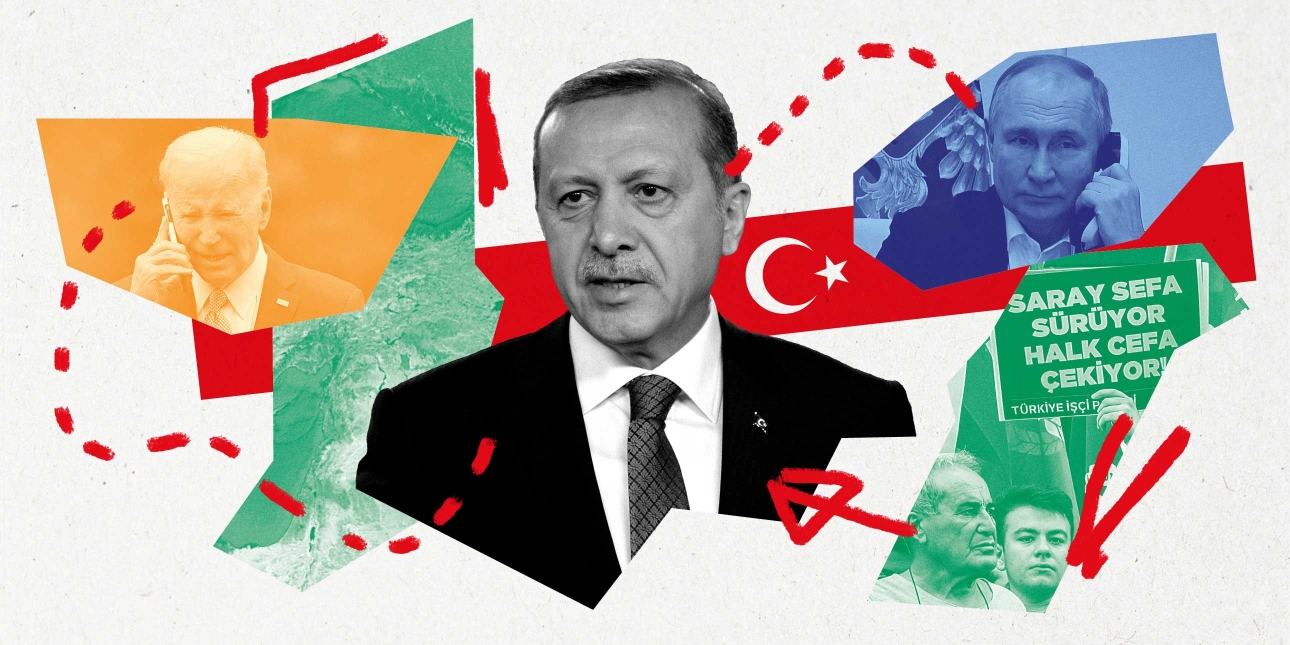Turkey: 100 years as a republic
Next month, Turkey celebrates the centenary of its declaration of independence. Recep Tayyip Erdoğan – the country’s strongman leader who has been in power for 20 of those 100 years – is an influential geopolitical player, but inflation and his growing authoritarianism are causing global concern, as City Am editor Andy Silvester explores here…
In recent years, you may have noticed the nation of Turkey wreaking something of a PR blitz: officially rebranding its name to Türkiye, ubiquitous #GoTürkiye, online/TV ads showcasing influencers flitting around the Aegean, its bid to host the Euro 2028 football championship.
These efforts might be helping promote Turkey on the international stage in the runup to next month’s [October] centenary celebrations marking the founding of the republic, but more work might be needed to improve the image of its leader, Recep Tayyip Erdoğan, who staggeringly, has been in power (firstly as prime minister, then president) for 20 of those 100 years.
Erdoğan’s newfound importance on the global stage isn’t an accident of geography, but opportunism.
Today, Erdoğan is something of a global weathermaker. For a rough explanation of how he got into this position, it’s probably worth applying Ernest Hemingway’s famous aphorism about how bankruptcy happens, ‘gradually, then suddenly’.
Erdoğan’s power is aided, admittedly, by geography. Straddling two continents, Turkey’s strategic location has been a strong drawcard for international trade since Constantinople (now Istanbul) was a vital staging post on the Silk Road. Today, Turkey has become once again a vital conduit between east and west. Bridging Europe and Asia, there aren’t many problems between the two continents - migration, war, global shipping – that can’t be dealt with without the tacit agreement of Ankara.
AN OTTOMAN OPPORTUNIST
Erdoğan’s newfound importance on the global stage isn’t an accident of geography, but opportunism. The war in Syria, which saw hundreds of thousands of refugees flood through Turkey on their way to Europe, gave him enormous leverage in Brussels; in meetings with other heads of state, he wasn’t shy of brandishing threats to “open the gates” and unleash a political maelstrom across the continent.
The war in Ukraine has seen him courted by Washington and Moscow. By showing just enough leg to keep them both interested, he’s helped position Turkey as a regional powerbroker to rival, if not overshadow, Iran. And Turkey’s effective veto over NATO expansion has seen him effectively dictate terms to the bloc, and to Sweden, over that country’s membership. Yet it’s wrong to see him as some kind of global statesman, bestriding regions and continents; he is a self-interested, transactional politician.
At home, too, Erdoğan’s ratcheting up of power has been brutal and unyielding, recognising where his strength lies and exploiting it. Since his election as prime minister in 2003, press freedom has been dramatically walked back, political opponents have been thrown in jail, secularism has been replaced with nationalist-religious institution-building and the civil service has been viciously purged. Such tactics have been stepped up since the coup attempt in 2016, which some opponents still believe was staged as a false flag incident to justify further repression. When The Economist claimed Erdoğan’s Turkey was on the brink of teetering into a full-blown dictatorship earlier this year, Erdoğan slammed the magazine as a tool of “global powers.”
AN DEEPENING ECONOMIC CRISIS
Why did none of this bother the Turkish electorate, who reelected Erdoğan for a third term in May? Granted, it was hardly a fair or free election, but it was no stitch-up either.
To paraphrase Bill Clinton’s famed adviser James Carville, Erdoğan’s popularity is down to the economy, stupid. The Turkish economy is three times the size it was in 2002; growth in the decade in the run-up to the pandemic ticked along at a happy average of around 6 per cent. Turks, especially in urban areas, grew richer.
That, however, is less sure to continue than it has been. In 2018, the Turkish economy was hit with a wave of inflation. In conventional economics, as we have seen with the wave of global inflation that has followed Covid, central banks would try to take the heat out of such an increase by raising interest rates. Erdoğan and his ministers felt differently, electing instead to slash rates - encouraging consumer spending and a credit boom. The politest way to describe this is exotic. The correct way to describe it is crackers. That decision left the Turkish economy horribly exposed to the global wave of inflation that struck in 2020, and that is why inflation shot up to around 40 per cent towards the start of this year, with the central bank using most of its foreign currency reserves to (largely unsuccessfully) prop up a tumbling lira. The Guardian recently interviewed an Istanbul belly dancer whose 100 lira tip in 2018 - worth £22 - is now worth just three quid.
After his re-election, Erdoğan appeared to change course. He has appointed a youngish central bank governor, Hafize Gaye Erkan, a graduate of Harvard, Princeton and Stanford. Her appointment came after a decision to hike the interest rate from 8.5 per cent to 15 per cent, hoping to pour cold water on an economy running completely out of control. International investors will hope for some consistency and reliability, and predictability. Turks will hope for similar. Early signs are that inflation may, finally, be beginning to cool, and the country's location, educated urban population and established global distribution networks will ensure it remains part of the international political and economic conversation.
As for the man in charge, he’ll keep playing the cards he’s dealt: for the benefit, almost exclusively, of Recep Tayyip Erdoğan.
“Today Turkey has become once again a vital conduit between east and west… There aren’t many problems between Europe and Asia that can’t be dealt without the agreement of Ankara”
“The politest way to describe Erdoğan’s economic policy is exotic. The correct way to describe it is crackers.”
“The Guardian recently interviewed an Istanbul belly dancer whose 100 lira tip in 2018 - worth £22 - is now worth just three quid.”


